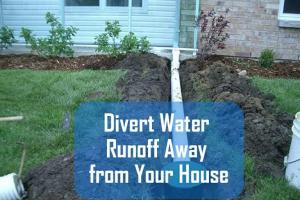Effective Strategies to Divert Water Runoff Away from Your House

-
Quick Links:
- Introduction
- Understanding Water Runoff
- Identifying Problem Areas
- Landscaping Solutions
- Drainage Systems
- Installing Gutters and Downspouts
- Case Studies
- Expert Insights
- Step-by-Step Guide
- FAQs
Introduction
Water runoff is a common issue that homeowners face, especially during heavy rainstorms. If not properly managed, it can lead to significant water damage, foundation issues, and even mold growth in your home. This article will explore effective strategies to divert water runoff away from your house, ensuring your property remains safe and dry.
Understanding Water Runoff
Water runoff occurs when rainwater flows over the ground surface instead of being absorbed into the soil. Many factors contribute to this phenomenon, including soil type, landscaping, and the slope of your property. Understanding these factors is crucial in developing an effective water management strategy.
The Impact of Water Runoff
Excess water runoff can lead to various problems, including:
- Soil erosion
- Water pooling around your foundation
- Basement flooding
- Damage to landscaping and gardens
Identifying Problem Areas
The first step in diverting water runoff is identifying where the issues are occurring. Walk around your property during a rainstorm and observe where water tends to pool or flow. Take note of:
- Low spots in your yard
- Areas with poor drainage
- Where water flows towards your house
Landscaping Solutions
Landscaping can be a powerful tool in managing water runoff. Here are several effective strategies:
1. Grading Your Yard
Proper grading ensures that water flows away from your home. This involves sloping the ground away from your foundation at a 2% grade.
2. Installing Rain Gardens
Rain gardens are designed to capture and absorb runoff. They consist of native plants and soil that can handle large volumes of water.
3. Using Permeable Pavers
Consider using permeable materials for driveways and walkways. These allow water to seep through, reducing runoff.
Drainage Systems
Installing a drainage system can be beneficial for managing water runoff effectively. Here are some options:
1. French Drains
French drains are underground systems designed to direct water away from your foundation. They consist of a trench filled with gravel and a perforated pipe.
2. Surface Drains
Surface drains collect water from your yard and direct it to a designated drainage area. This can be particularly effective in areas with heavy rainfall.
Installing Gutters and Downspouts
Gutters and downspouts play a crucial role in diverting water runoff from your roof away from your home’s foundation. Ensure they are properly installed and maintained:
- Clean gutters regularly to prevent blockages.
- Ensure downspouts direct water at least 3-4 feet away from your foundation.
- Consider using downspout extensions for added distance.
Case Studies
Understanding how others have successfully managed water runoff can provide valuable insights. Here are two case studies:
Case Study 1: Residential Property in Seattle
A homeowner in Seattle faced severe water pooling around their foundation. By implementing a combination of grading, installing a rain garden, and a French drain system, they successfully redirected runoff away from their home.
Case Study 2: Suburban Home in Florida
In Florida, a homeowner struggled with basement flooding during heavy rains. They upgraded their gutters, installed surface drains, and re-landscaped their yard to enhance drainage, effectively reducing flooding incidents.
Expert Insights
We consulted with landscape architects and drainage experts who emphasized the importance of proactive measures:
"Understanding your property’s natural drainage patterns is essential. Work with the landscape, not against it." – Jane Doe, Landscape Architect.
Step-by-Step Guide
Follow these steps to effectively divert water runoff from your house:
- Assess your property for problem areas.
- Decide on landscaping solutions that suit your yard.
- Install necessary drainage systems.
- Maintain gutters and downspouts regularly.
- Monitor your property during heavy rains and adjust strategies as needed.
FAQs
1. What happens if I ignore water runoff issues?
Ignoring water runoff can lead to structural damage, flooding, and increased repair costs.
2. How can I tell if my yard is poorly graded?
If water pools near your foundation or flows towards your home, your yard may be poorly graded.
3. Can I use plants to help with drainage?
Yes, native plants can absorb water and help manage runoff effectively.
4. How often should I clean my gutters?
It is recommended to clean your gutters at least twice a year, especially before and after the rainy season.
5. What is a rain garden?
A rain garden is a planted depression that allows rainwater runoff from impervious areas to be absorbed.
6. Are there any DIY solutions for diverting water?
Yes, many homeowners successfully create simple drainage solutions such as swales and berms.
7. How can I tell if my drainage system is working properly?
Monitor water flow during heavy rain; if water is directed away from your home, your system is likely working well.
8. Can landscaping help reduce water runoff?
Absolutely! Smart landscaping can significantly mitigate runoff by promoting absorption and redirecting water.
9. What types of drainage systems are best for residential properties?
French drains and surface drains are commonly recommended for residential areas to effectively manage runoff.
10. Is it worth hiring a professional for drainage solutions?
If you're unsure about your options or the extent of your runoff problems, consulting a professional can provide valuable insights and solutions.